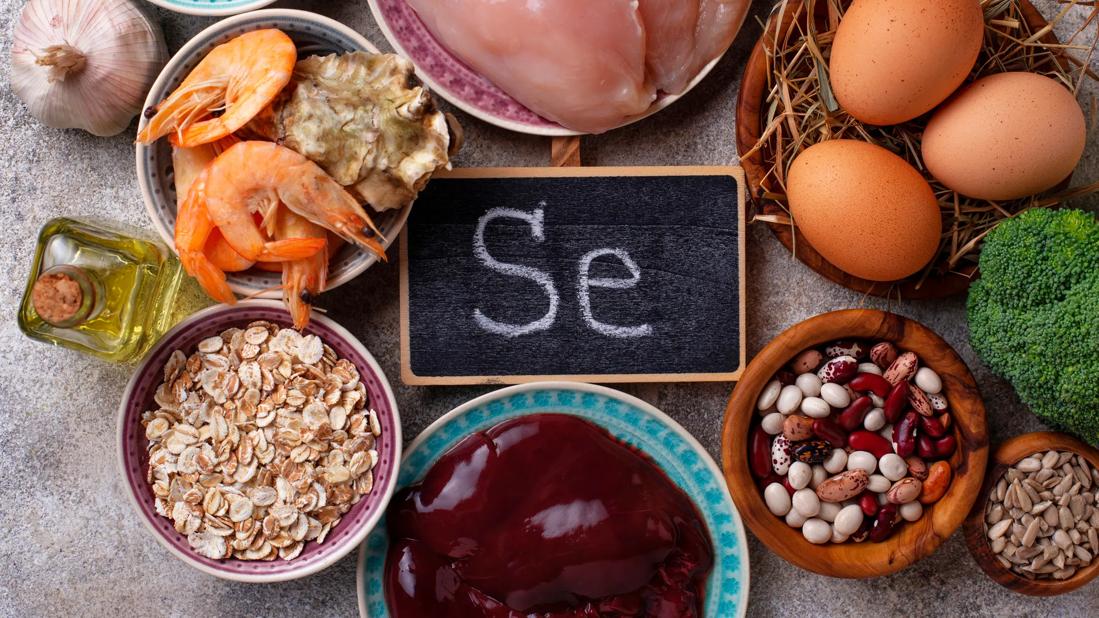Only take supplements recommended by your healthcare provider — others can worsen your condition

Image content: This image is available to view online.
View image online (https://assets.clevelandclinic.org/transform/966cd3f2-a956-437a-be8f-f66f40968d2d/foods-with-selenium-1199505489)
Assorted foods with selenium on plates and in bowls, with chalkboard with SE on it
If you have hyperthyroidism (overactive thyroid), your body makes too much thyroid hormone. That speeds up your metabolism and can cause issues like heart palpitations, weakness, shakiness, trouble sleeping and more.
Advertisement
Cleveland Clinic is a non-profit academic medical center. Advertising on our site helps support our mission. We do not endorse non-Cleveland Clinic products or services. Policy
It’s natural to want to find remedies to make you feel your best. And some people will turn to supplements for hyperthyroidism in an effort to feel better.
But some thyroid supplements are better choices than others. And if you do take supplements, how much you take can matter, too.
We asked endocrinologist Ravali Veeramachaneni, MD, for her advice about common supplements people take for hyperthyroidism.
It’s easy to get caught up in the idea that supplements are safe. They’re sold over the counter everywhere, from grocery stores to vitamin shops and countless websites. And the claims can be very convincing.
The trouble is that you don’t always know what’s in those bottles. And that disclaimer on vitamins — This statement has not been evaluated by the Food and Drug Administration. This product is not intended to diagnose, treat, cure, or prevent any disease — it’s there for a reason.
No self-selected supplement should ever take the place of doctor-prescribed medication or other personalized advice from a trusted healthcare provider.
And when you’re living with hyperthyroidism, some of those “thyroid health” supplements you see on the shelves aren’t going to be right for you. So, always check with a healthcare provider first.
Advertisement
Dr. Veeramachaneni offers suggestions on supplements to avoid and what supplements to ask your provider about.
People with hyperthyroidism shouldn’t take certain supplements, including ones that are marketed as supporting healthy thyroid function. They can worsen your condition.
People with hyperthyroidism should not be taking iodine, which is a common ingredient in many thyroid health supplements.
“Iodine is important to thyroid health, but iodine deficiency isn’t common in the U.S. and other parts of the world where foods are commonly fortified with iodine,” Dr. Veeramachaneni explains.
Increasing your iodine intake with supplements can mean making even more thyroid hormone. Which isn’t the goal for people with hyperthyroidism.
“When you take iodine supplements, you risk making even more hormone and worsening your condition,” she warns.
The logical question, then, is, Should I cut iodine out of my diet?
The short answer? No.
“Iodine is so prevalent in our food supply that removing it from your diet is too restrictive to be healthy for most people,” Dr. Veeramachaneni advises.
L-tyrosine can help to increase thyroid hormone production.
“So, when you’re already living with an overactive thyroid, it can just add more to the mix,” Dr. Veeramachaneni shares. “You don’t want any more thyroid hormone than you’re already making.”
L-tyrosine is an amino acid, meaning it’s a building block for protein. It helps your body produce enzymes, melanin and thyroid hormone, among other jobs.
Some people take L-tyrosine supplements to improve memory, lower stress and improve symptoms of depression. You’ll also find it as a common ingredient in thyroid health supplements. But if you have hyperthyroidism, it should be avoided.
Selenium is an essential mineral that supports a healthy thyroid gland, and your healthcare provider may recommend it for hyperthyroidism. But you don’t need much of it.
Recommended dietary allowance (RDA) for selenium:
Most people are getting plenty of selenium in their diets. But if you have hyperthyroidism or thyroid eye disease, your provider may suggest a selenium supplement, up to 200 mcg.
If you’re living with hyperthyroidism, know that treatment is available to help you manage your condition and live a healthy life. But talk with your healthcare provider before taking any supplements.
Advertisement

Sign up for our Health Essentials emails for expert guidance on nutrition, fitness, sleep, skin care and more.
Learn more about our editorial process.
Advertisement
Hypothyroidism is underactivity of your thyroid gland, while hyperthyroidism is overactivity — but both conditions need treatment
No diet can cure hypothyroidism or hyperthyroidism, but some foods and supplements can cause trouble
Foods high in selenium, like Brazil nuts, cottage cheese and some fish, can help support healthy thyroid function
Typical signs include growth delays and low energy
Hyperthyroidism can make you feel sluggish and exhausted — but so can other conditions
The truth about natural thyroid symptom relief
An expert weighs in
How overtreatment for hypothyroidism places you at risk
Although it could be used as a moisturizer, this new trend is not recommended
Communicating clear limits helps protect your time, energy and emotional well-being
High cholesterol can be genetic, but testing and treatment can lower your heart disease risk